The project is a joint initiative of the United Nations Development Program, the Ministry of Economy and Finance being implemented with financial support of the Islamic Development Bank (IDB) and OPEC Fund for International Development to create favorable living conditions for rural residents and ensure their access to basic infrastructure, socio-economic services including access to health and education. Rising living standards of about 710 000 rural people of 170 makhalla communities (40 central and 130 adjoining makhallas) in 20 districts of the Republic of Karakalpakstan, Bukhara, Navoi and Khorezm regions by improving road and transport infrastructure, engineering and communication networks, power supply system, application of resource-saving and environmentally friendly technologies in construction and renovation of social facilities such as kindergartens, secondary schools and rural clinics through strengthening participatory local governance processes in target regions.
2020-2025
Subprojects
+895
+170
170 lagging communities of Karakalpakstan, Khorezm, Bukhara and Navoi regions.

The above-mentioned sub-projects are determined, planned and implemented with the direct participation of residents of local communities (mahallas) based on an analysis of the existing primary needs of these settlements in specific objects of basic social infrastructure and services.
Through appropriate project activities, local authorities (khokimiyats), the gathering of Mahalla Citizens (SGM) and mahalla Development groups (GRM) develop skills and knowledge in the field of data collection, accounting, monitoring, operation and maintenance of specific social facilities, relevant environmental and social standards, disaster risk reduction, consideration of complaints from outside population and settlement of possible disputes in the framework of subprojects, procurement, etc.
According to the principles of the project, 50% of the members of the GRM from among the local residents are women. Their participation in the planning of subprojects and decision-making on issues related to their further implementation is ensured. In addition, the project helps to meet the needs of women for appropriate services that will ensure the commissioning of reconstructed or newly created social infrastructure facilities, for example, access to drinking water, kindergartens, etc.
The project provides various mechanisms that ensure transparency during implementation and accountability of the relevant persons involved in this process. For example, they include regular meetings with the local population to inform about existing project opportunities and the progress of specific subprojects, regular updating of project progress data on the project website, public monitoring of procurement and project progress, as well as specific subprojects, conducting social audits, etc..
The project contributes to improving the standard of living of the population in the above-mentioned settlements in rural areas. The project does not finance or otherwise support activities related to the forced relocation of local residents, or leading to the loss or reduction of their income and livelihood, or contributing to the use of child and forced labor, or which may lead to a negative impact on the environment in the project area.
After the completion of the selection of villages, the process of which is described in the operational manual of the project (available on the project website), about 306 settlements in rural areas of Andijan, Ferghana, Namangan, Jizzakh and Syrdarya regions have been identified for participation in project activities.
Communities
170
Regions
4
The funds were provided to the districts and villages covered by the project according to a simple formula linked to the population of the village. The financing allocated at the village level is set at about $160 per person to finance the above-mentioned infrastructure sub-projects. It is expected that more than 330,000 rural residents, half of whom are women, will benefit directly from the implementation of project activities.
The relevant administrative and technical staff assist the residents of the villages covered by the project in planning and implementing their infrastructure sub-projects. Qualified local and international NGOs can also participate in the implementation of the goals and objectives of the project.
Strict social and environmental standards of the World Bank are applied in the project area. In particular, they are aimed at ensuring the labor rights of persons involved in the implementation of infrastructure subprojects, as well as protecting the rights of private property of local residents.